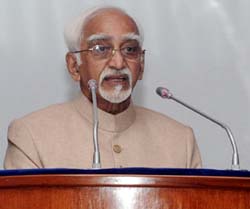NEW DELHI, Oct 14:
Vice-President Hamid Ansari today lamented the lack of a formal National Security Strategy document in India which officially projects a comprehensive approach to security, and underlined the importance of an effective and a responsive political structure for a comprehensive security setup.
Speaking at the National Defence College here on ‘Effective Political Structure — A Critical Ingredient to operationalise National Security Strategy’, Dr Ansari said sustainable security was possible only through a strong society and economy, defence preparedness and competence of its diplomatic institutions coordinated by effective and responsive political structure.
“…We in India do not have a formal document in the shape of a National Security Strategy document to project officially a comprehensive approach to security. Sustainable national security for a country is an outcome of the good health and strength of its society and economy, its Defence preparedness and competence of its diplomatic institutions. The attainment of these goals in a coordinated manner depends critically on an effective and responsive political structure,” he said.
Going beyond Chapter 1 of the Annual Report of the Defence Ministry, he said much of the discussion on this pertained only to traditional or military security and unavoidably touching upon developing challenges and evolving capacities and strategies.
This had limited utility since comprehensive planning scenarios and predictions did not cover all eventualities.
“…And history is replete with the fate of doctrines that did not survive the first contact with the enemy,” the Vice-President said.
Touching upon the non-traditional segment of national security focusing on comprehensive or human security, the Vice-President said it was “fuzzier” because while governments and societies had traditionally attended to its individual aspects, fewer attempts had been made to develop a conceptual framework.
Dr Ansari said political structures had to be effective in dealing with both internal and external threats to national security and territorial integrity could be protected by creating strong, well equipped and modern armed forces, para-military and civil police institutions.
Either as a result of the political processes or distorted socio-economic developments, many internal threats and challenges emanated from real or perceived exclusion from the mainstream of a section of its citizen body.
This was true in case of India too, he added.
Highlighting rampant poverty, rising inequality, unemployment, illiteracy, discrimination based on religion, caste, creed, language, race or ethnicity as some of the reasons which lead to extremism and violence, he said there were examples of this in different parts of the country and not all of them could be attributed to external inputs.
These problems did not have a purely military solution and could not be treated merely as a law and order issue but required robust political intervention aimed at seeking solutions within the constitutional framework.
Stressing the importance of keeping the neighbourhood peaceful and stable for pursuit of India’s developmental goals, Dr Ansari said the Government sought this through peaceful resolution of disputes, enhanced trade and economic relations, and greater people-to-people contact.
“These are essential ingredients of a comprehensive strategy to safeguard and promote national interest,” he said.
Diplomacy, the Vice-President said, had a critical role in building international partnerships against trans-national threats and in promoting interests.
For each of these, effective domestic political structures were essential to enable a country participate in the international fora on equal footing with credible domestic mandate to ensure that national interests were safeguarded in bilateral and multilateral negotiations.
The Vice-President said in view of seamlessness of civil and military inputs that go into the formulation and operationalsiation of national security strategy, strict compartmentalization of civil and military dimensions of national security was erroneous.
“Instead, the need of the moment is a more integrated approach with dynamic oversight of the elected political leadership,” he said.
There was no reason why different disciplines could not be interactive and cooperative in pursuit of a common objective, Dr Ansari said. (UNI)


